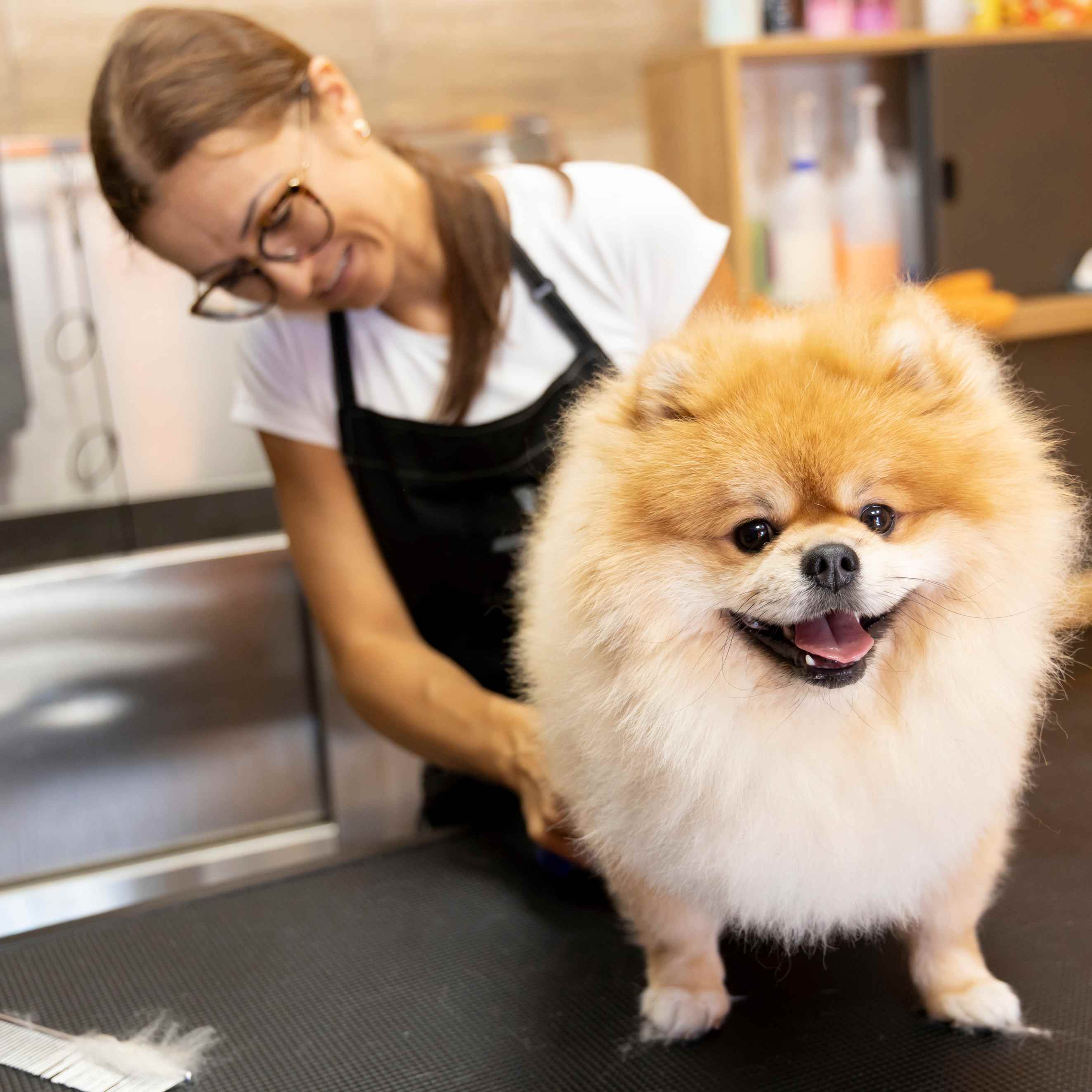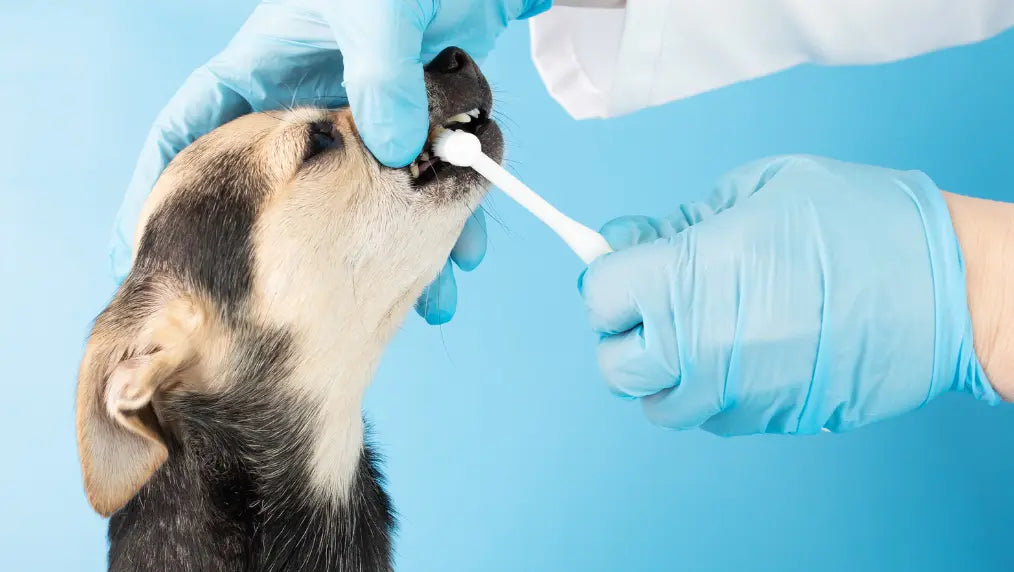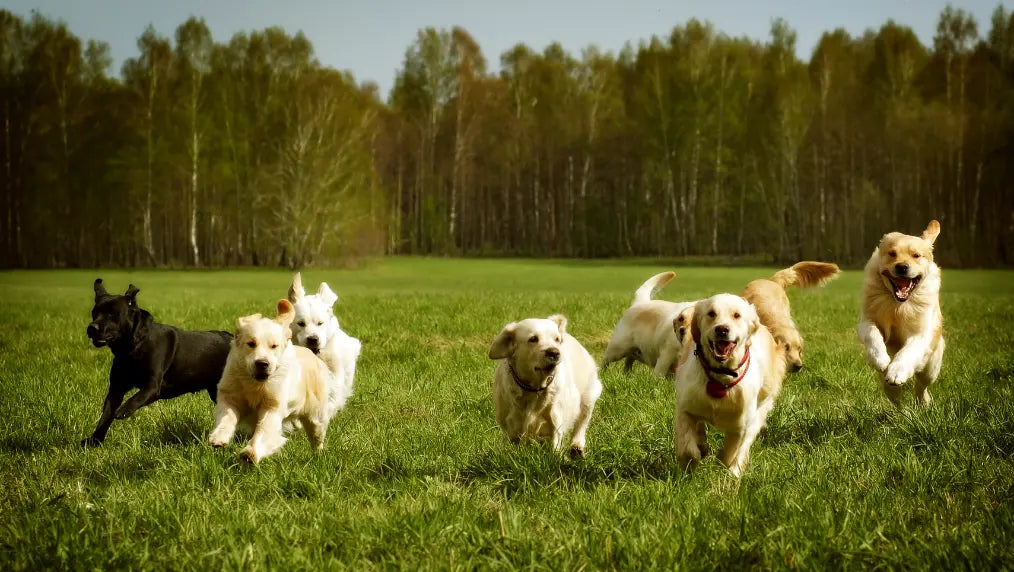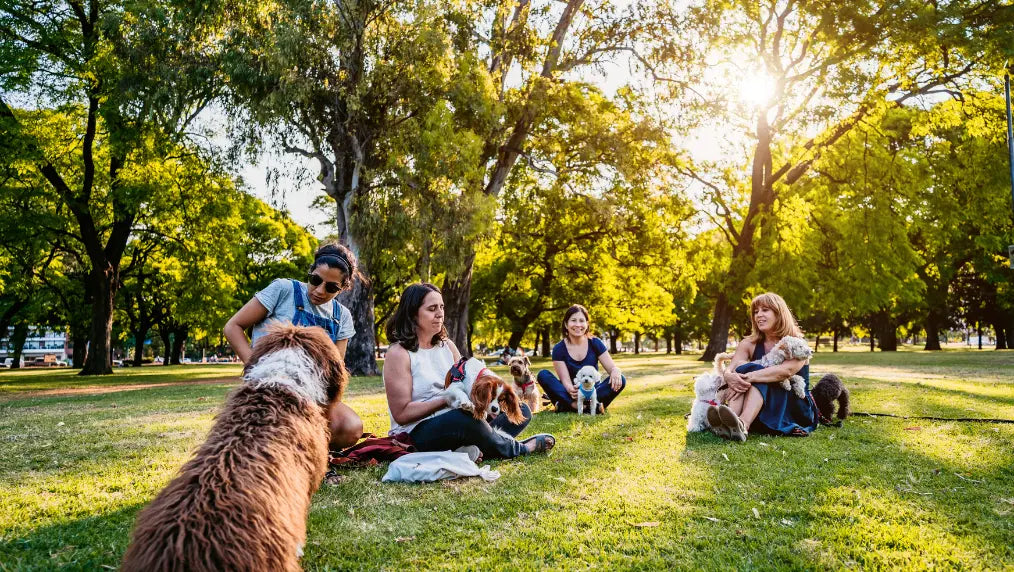Ahh puppies - who doesn’t love a fluffy little baby dog? Puppyhood is one of the most magical times of a dog’s life, but unfortunately, many things often get overlooked during the excitement of getting a new puppy. Many new pet parents make the mistake of not getting their dog accustomed to grooming practices and bathing, which can lead to issues down the road.

The Benefits of Grooming
Grooming isn’t just about a dog’s looks. Starting a regular grooming routine with your pup has many benefits for you and them:
-
Behavior: grooming helps your puppy get used to being handled, which can make future experiences (like vet visits) go smoothly
-
Health and safety: when you groom your puppy, you can inspect them for any pests, bumps, scrapes, or health issues
-
Coat and skin health: grooming removes dead skin and hair, potentially slowing shedding and keeping your pup’s hair and skin feeling their best.
-
Bonding and socialization: Regular grooming will bring you and your puppy closer together, and help them learn to get along with other people, too.
Also Read - What To Do If Your Dog Eats Chocolate: A Comprehensive Guide
When to Start Puppy Grooming Methods

Puppies do not need real professional grooming until they’re about 10-16 weeks old and have had all their shots. But why do the shots matter? Because your puppy needs vaccinations before interacting with other dogs or visiting locations with lots of dog traffic. Professional groomers typically require puppies to be fully vaccinated before their first visit to the shop.
Vaccinating your puppy is one of the most important things to do in your first few weeks as a dog owner. Regular vaccinations help puppies grow into older canines who remain free of infectious diseases, and also prevents them from passing nasty diseases on to other animals. The puppy shot series usually starts between 6–8 weeks of age, with new vaccines and boosters given every 3–4 weeks until your puppy is 16–17 weeks.
However, you can start grooming your puppy yourself at home right away. The sooner you start handling them; the better behaved they’ll be later on! Brush your dog regularly with a soft-bristled brush, gently “brush” their face with your fingers, and practice holding their paws. Eventually, you’ll work in a simple nail trim. And of course, have plenty of treats on hand to reward them for being so good! This will making the grooming experience much better for them as time goes on.
Puppy Grooming Early: The Benefits
Familiarity with Handling:
Early grooming helps the puppy get used to being handled, touched, and examined. This is crucial for veterinary visits, as well as any grooming procedures they may need throughout their life.
Most puppies are used to being petted, held, and snuggled by the time they’re ready to go to their forever homes. However, this doesn’t mean they’re fine with being touched everywhere. In order for a dog groomer to do the best job possible, a dog needs to be at least somewhat cooperative.
And if your dog isn’t conditioned to having their face, nails, tail, and paws handled, it can lead to problems down the line. It will also get them used to loud noises. After all, desensitizing your dog to the groomer in their first few months of life is much easier than doing it at an older age. Even something as simple as having a dog's nails trimmed can be more difficult if you do not get them used to it earlier in life.
Prevention of Fear or Anxiety:

Regular puppy grooming sessions from a younger age can prevent the development of fear or anxiety associated with grooming activities. This helps in creating a positive association with grooming tools and processes. The grooming process and experience from the first groom to a full groom can be stressful for both you and your dog, but they don't have to be.
Establishing Routine
Introducing grooming as part of a puppy's routine helps them understand that it is a normal and necessary activity. This can make future grooming sessions more manageable and less stressful for both the puppy and the owner.
Most dog groomers realize that a puppy’s first few appointments are important. A good groomer will spend much of the first appointment bonding with the puppy and demonstrating that their grooming tools they use for things such as ear cleaning, nail trimming, cleaning your puppy's ears, and cutting your pup's fur are harmless. During these crucial moments, your puppy will receive lots of love, attention, and treats.
This helps your new family member form positive associations with being groomed so that they can live a more carefree and enriching life. A cooperative pet will look and feel better after a groom. Not only that, but cooperative pups also have access to more hairstyle and accessory options that fearful dogs do not.
Health Monitoring:
Grooming sessions provide an opportunity to check the puppy's overall health. It allows owners to examine their puppy's skin, coat, ears, eyes, and teeth regularly, helping in early detection of any potential health issues.
Dog grooming isn’t just about making your dog look clean and presentable. It’s also about maintaining the health and wellbeing of your canine companion. While your puppy should be going to the vet once every 3-4 weeks, health problems can still develop in-between those times. Our dog groomers can detect problems such as ear infections, Hematomas, skin lesions, and Anemia. While they’re not veterinarians, they’re still trained to help maintain your dog’s wellbeing and detect certain issues.
Socialization
Grooming involves physical contact and interaction with different puppy breeds together, contributing to the socialization of the puppy. It helps them build trust with their owners and become more comfortable in various situations.
The importance of having a good relationship with your dog’s groomer is often understated. Since taking care of a dog is quite complicated, it’s essential for a groomer to know what their client is talking about. Oftentimes, groomers can misinterpret what their client says, especially new clients. Building a strong relationship with your dog’s groomer from a young age helps the groomer to understand the client’s preferences, which leads to less miscommunications and mistakes. It also makes your dog feel more comfortable than they would being tossed around from stranger to stranger.
Preventing Matting and Tangles:
Certain breeds require regular grooming to prevent their coats from matting and tangling. Starting grooming early helps prevent the development of severe matting issues that can be uncomfortable for the the puppy's face and body too.
We Recommend: THE LEAVE IN conditioner by PRIDE+ GROOM. A reparative, detangling, and gloss-inducing leave-in conditioner that benefits all coat types and hair lengths. Use it freely to get instant results that include extreme softness and shine. The PRIDE+GROOM team uses it on our own heads before blowdrying as it cuts humidity adds a nice sheen, and that's the truth!
Positive Reinforcement Training:
Grooming sessions provide an opportunity for positive reinforcement training. Rewarding the puppy for calm and cooperative behavior during a grooming session helps reinforce good behavior and makes future grooming with a professional groomer easier.
Also Read - The Best Condolence Gifts for Pet Loss
What Kind Of Grooming Does Your Puppy Need?
Short Coat
Most puppies benefit from weekly brushing, and some need haircuts and styling to keep their hair healthy. Here’s a list of common coat types and their basic grooming tips and needs
Dogs with short, smooth coats don’t need much grooming. Daily pets and a weekly brushing should be plenty. Use a grooming mitt to loosen dead hair and dirt, and then a bristle brush to remove it. If your puppy has a short, thick covering, they don’t need a haircut. Their fur will stay short all by itself!
Some short-coated dog breeds include Dobermans, Beagles, Labrador retrievers, Dachshunds, Bulldogs, and Great Danes.
Long and Silky Coat

Puppies with long coats may need daily combing to keep their fur silky and untangled. A wide-toothed comb works well, and you or the groomer can trim any “wild hairs” that are interfering with your puppy’s vision or movement.
Silky-coated dogs benefit from daily brushing, and occasional trims to keep hair out of their eyes. Unless they’re rolling in mud, limit baths to once per month or less. Too much bathing can dry out their skin and coat.
Some long and silky-coated dog breeds are Malteses, Afghan Hounds, Bearded Collies, Yorkies, Spaniels, and Soft-coated Wheaten Terriers.
Double Coated
Double-coated dogs have a top layer of longer “guard hair” over a short, soft layer of downy fur. The dense undercoat protects them from heat and cold, and the top coat repels dirt and moisture. If neglected, the downy layer can cause mats to form. Puppies with double coats need regular brushing, especially as their adult coat is coming in!
Note: double-coated dogs do not require haircuts. Both layers serve a purpose, and if you shave down the protective top layer, the bottom layer can get matted. Brush them out regularly to remove dead fur, and otherwise let the coat take care of itself.
Double coated dog breeds may include Akitas, Pomeranians, Huskies, Shiba Inus, Newfoundland, Bernese Mountain Dogs, and more.
Curly and Wiry Coat
Curly-coated dogs need regular trims, about every six weeks. You can opt for a fancy show cut, or a simple trim to keep their coat healthy. Dog breeds with curly coats include standard and Miniature Poodles, Portuguese Water Dogs, and Bichon Frises.
Dogs with wiry coats sometimes need their hairs plucked to maintain a healthy coat, and two or three trims per year. Some wire-haired dogs include Fox Terriers, Jack Russell Terriers, Brussels Griffons, and Border Terriers.
Conclusion
When you bring your new family member home, getting that fluffy puppy coat groomed may not seem like a priority. But a proper introduction to grooming is an important part of raising a well-socialized and healthy dog. Regular grooming is an essential part of caring for your puppy’s overall health and well-being.
As well as helping your new arrival to look their best, regular grooming can help prevent the uncomfortable matting and tangling of fur while helping you spot any underlying health concerns that may need veterinary attention.





